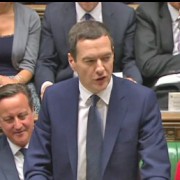How the Chancellor’s 2014 Autumn Statement affects YOU!
George Osborne, the Chancellor of the Exchequer, announced his Autumn Statement on Wednesday (3 Dec 2014) in what could be seen as a mini budget. Here we focus on the key announcements, concentrating on those relating purely to taxation, as it is those which affect you, our customers, most directly.
1). First some good news: The UK is seeing the fastest growth out of all the G7 countries, and the number of people employed is at its highest point ever. This is good for all of us because it restores optimism in the UK economy, higher employment speaking for itself.
2). As we announced in a separate blog post, Stamp Duty (Land Tax) has been given a major shake-up and, for anyone buying a house for £935,000 or less, the amount of Stamp Duty which they’ll have to pay will be less, and sometimes very significant. See our separate blog post and infographic for more detail.
3). In the financial year 2015-16, the tax-free personal allowance (which is the amount you can earn before you start to pay any tax) will increase to 10,600 which is an increase of £600. So … more tax-free money in your pocket, which is good.
4). Economy flights will become cheaper for under 12s from 1 May 2015 and under 16s from 1 March 2016, because their tickets will become exempt from tax on those dates. So … a small concession, but another welcome one. Average 4-person families will save £26 for flights within Europe and £142 on flights to the U.S.
5). From 3 December 2014, spouses will be able to inherit their partner’s ISA benefits should their partner pass away. Currently this is not the case and the change will mean that, from 6 April 2015, the surviving spouse or civil partner will be able to Read more


 Do you have online banking? Sending us downloaded statement information straight from your online banking means we can more easily import the data into our system and check for expenses and income which might otherwise have been overlooked. It can also fill in the gaps where you are missing receipts or invoices. This simple service could therefore save both time and money! Most online banking platforms allow you to export this information, for example as a CSV file, and this format is perfect for our accounting system.
Do you have online banking? Sending us downloaded statement information straight from your online banking means we can more easily import the data into our system and check for expenses and income which might otherwise have been overlooked. It can also fill in the gaps where you are missing receipts or invoices. This simple service could therefore save both time and money! Most online banking platforms allow you to export this information, for example as a CSV file, and this format is perfect for our accounting system. Part of the Chancellor’s recent Budget included plans to recover tax owed to the Treasury direct from the debtor’s bank account — all done directly and without a Court Order being necessary. This has been criticised widely but HMRC says that only 17,000 people in the UK per year would fall into this potential scenario and that it would only occur for those owing more than £1,000 in unpaid tax or tax credits owed. Moreover they say that they would only target long-standing tax debts from those who had received a minimum of 4 payment demands and whose bank and savings accounts combined had a minimum total balance of £5,000 or more remaining after any tax bad been directly seized. Also the debtor involved will have been issued with a final warning period of 14 days, during which the funds concerned would be frozen, before any tax was directly withdrawn.
Part of the Chancellor’s recent Budget included plans to recover tax owed to the Treasury direct from the debtor’s bank account — all done directly and without a Court Order being necessary. This has been criticised widely but HMRC says that only 17,000 people in the UK per year would fall into this potential scenario and that it would only occur for those owing more than £1,000 in unpaid tax or tax credits owed. Moreover they say that they would only target long-standing tax debts from those who had received a minimum of 4 payment demands and whose bank and savings accounts combined had a minimum total balance of £5,000 or more remaining after any tax bad been directly seized. Also the debtor involved will have been issued with a final warning period of 14 days, during which the funds concerned would be frozen, before any tax was directly withdrawn. HMRC (Her Majesty’s Revenue & Customs) has announced some new initiatives over the course of the last month and one of these is The Let Property campaign which is a campaign designed to recover undeclared tax from those receiving income from residential property lets. The idea is to encourage those landlords with under-declared income or gains (potentially including income tax, Capital Gains Tax and VAT) to contact them in order to make a full disclosure. By doing so they may well avoid the higher penalties which may be applied to them should HMRC discover the undeclared income/gains via other means. Don’t forget that they now have access to information shared across systems, including in relation to properties both at home and abroad, as well as being gained through their digital intelligence system ‘Connect’ which identifies links between individuals, entities and properties. So the message to landlords is loud and clear!
HMRC (Her Majesty’s Revenue & Customs) has announced some new initiatives over the course of the last month and one of these is The Let Property campaign which is a campaign designed to recover undeclared tax from those receiving income from residential property lets. The idea is to encourage those landlords with under-declared income or gains (potentially including income tax, Capital Gains Tax and VAT) to contact them in order to make a full disclosure. By doing so they may well avoid the higher penalties which may be applied to them should HMRC discover the undeclared income/gains via other means. Don’t forget that they now have access to information shared across systems, including in relation to properties both at home and abroad, as well as being gained through their digital intelligence system ‘Connect’ which identifies links between individuals, entities and properties. So the message to landlords is loud and clear!